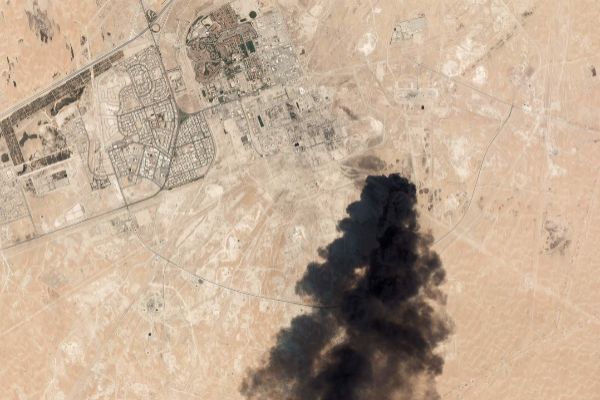- Saudi Arabia Trump says he doesn't want a war with Iran but warns that the US is "better prepared"
- Editorial.More uncertainty about the rise in oil
The United States government seems to have entered into a kind of confusion ceremony following the attack on Saturday at the Abqaiq petrochemical complex, the largest in the world, in Saudi Arabia. On the one hand, their spy services claim to have discovered from which military installations in the territory of Iran the pilotless planes that hit Abqaiq and, also, in the Khurais complex, of smaller dimensions, left. The accusation made by Washington and Riyadh against Iran could open the door to possible military actions of those countries against Tehran, which nevertheless denies their participation in the operation .
The only ones who have vindicated the action are the rebels of the Houthi tribes of Yemen, who have maintained a rebellion against the Government of that country for five years. The Houthis, supported by Iran, control the capital of Yemen, Sanaa. The Yemeni government has the backing of Saudi Arabia , which has invaded the country, and the United States, whose airplanes carry out logistical support missions of Riyadh's forces in the war. According to the US, Iran hit the Saudi oil facilities with 17 projectiles; Houthis, however, claim to have thrown only 10 drones.
But the White House does not seem willing to carry out military actions . On Monday night, at an election rally in the state of New Mexico, President Donald Trump asked the Americans "not to panic . " Meanwhile, Secretary of State Mike Pompeo will travel to Saudi Arabia to examine the situation in detail with Crown Prince and Saudi strongman Mohamed bin Salman, who is very close to Trump's son-in-law, Jared Kushner, possibly the person with the most ascending over the president after his daughter, Ivanka.
According to the CBS television network, the attack was not with drones, but with missiles, which left Iran's territory. At least one of the projectiles flew over the airspace of Kuwait, a close ally of the US and a traditional rival of Iran, but also of Iraq and Saudi Arabia. CBS, which has cited anonymous sources from the US intelligence services, argues that the Saudi air defense systems were facing south, in anticipation of missile launches and drones by Houthis. In the last year, this community has carried out several bombings on Saudi Arabia, even attacking the country's capital, Riyadh, with Iranian-made missiles and drones.
If the CBS information is true, however, it would raise new questions. The most obvious is how it is possible that the Saudi air defense is oriented only to prevent attacks from the south - where Yemen is - when that country is permanently on the verge of war with Iran - to the north - and, even more, when the own The United States has accused Iraqi pro-Iranian militias - to the northwest - of launching drone attacks against Riyadh in the past.
Saudi incompetence in the management of the Yemen war has reached epic levels, to the point that the Riyadh Government has had to employ former FARC guerrillas, former soldiers, and former Colombian paramilitaries to carry out military operations. The Houthis, meanwhile, deny having received help from Iran. But their drones are, according to UN experts last month, identical to those made by several Iranian companies.
According to the criteria of The Trust Project
Know more- Iran
- Saudi Arabia
- U.S
- Yemen
- Iraq
United States Trump says the US is "charged and ready" to respond to the attack in Saudi Arabia
Attacks in Saudi Arabia Trump says he doesn't want a war with Iran but warns that the US is "better prepared"
Middle East Saudi Arabia claims that Iranian weapons were used in the attack on the refineries and denies that it originated in Yemen

